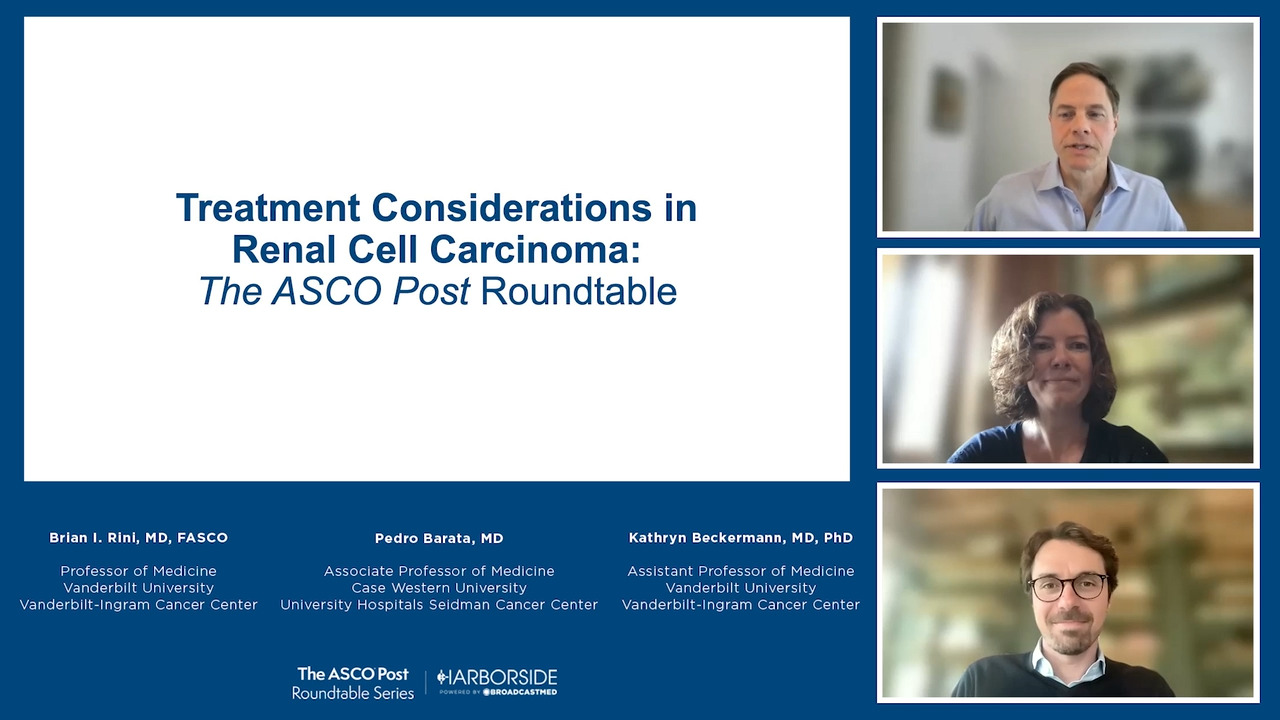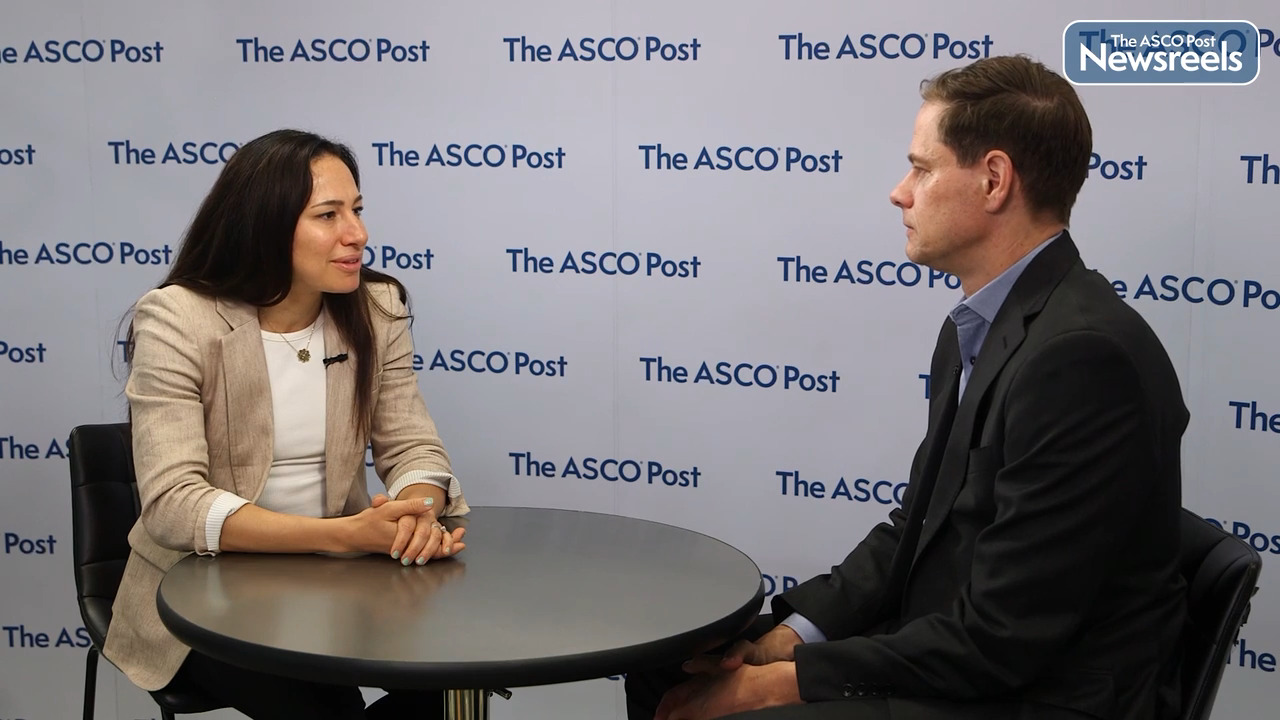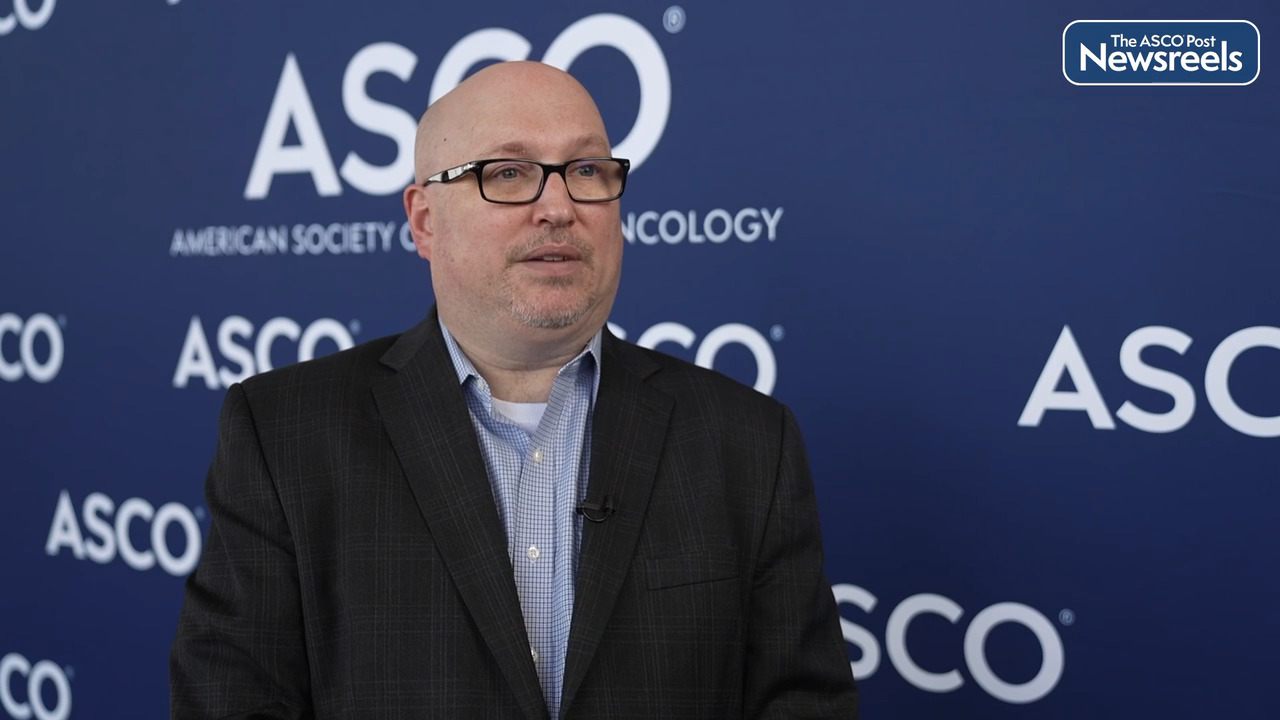Metastatic RCC After Disease Progression on VEGF/IO Therapy
This is Part 3 of Later-Line Considerations in Relapsed/Refractory Renal Cell Carcinoma, a three-part video roundtable series. Scroll down to watch the other videos from this roundtable. In this video, Drs. Rana McKay, Bradley McGregor, and Sumanta K. Pal discuss the management of metastatic renal cell carcinoma (RCC) after disease progression on VEGF-targeted therapy and immunotherapy (IO). The patient is a 56-year-old woman who presented in 2015 with sharp abdominal pain. Imaging revealed a large renal mass, and CT of the chest and brain MRI were negative. She underwent a left nephrectomy, which revealed a 10.9-cm grade 3 renal cell carcinoma with renal vein invasion. After 4 years of surveillance, a CT of the chest, abdomen, and pelvis revealed pulmonary nodules and a right adrenal nodule. She started treatment with nivolumab plus ipilimumab, continuing to receive maintenance nivolumab after completion of therapy. One year later, she developed a retinal detachment related to immune infiltrates, which led to the permanent discontinuation of nivolumab. She continued to be monitored, and her disease was found to be stable with the exception of growing right adrenal nodule, for which she received stereotactic ablative body radiotherapy. The following year, she experienced disease progression in her lungs with multiple new pulmonary nodules. In the conversation that follows, the faculty discuss how to approach the management of a patient presenting with newly diagnosed metastatic RCC, the role of radiation therapy for patients with oligoprogressive disease, and treatment options in the later-line setting for patients whose disease progresses on VEGF-targeted therapy and IO.
Refractory RCC After Disease Progression on Adjuvant IO Therapy
This is Part 2 of Later-Line Considerations in Relapsed/Refractory Renal Cell Carcinoma, a three-part video roundtable series. Scroll down to watch the other videos from this roundtable. In this video, Drs. Rana McKay, Bradley McGregor, and Sumanta K. Pal discuss the management of refractory renal cell carcinoma (RCC) after disease progression on adjuvant immunotherapy (IO). The patient is a 50-year-old man who underwent an early cancer detection test in 2022 and received a positive test result. A CT of the chest, abdomen, and pelvis revealed a 5.1-cm right upper pole mass in the kidney. He underwent a right partial nephrectomy and was found to have grade 3 clear cell RCC with perinephric fat invasion and renal vein invasion. The patient received pembrolizumab for 1 year, followed by a 3-month surveillance schedule. On his first subsequent scan, he was found to have new small pulmonary nodules and underwent a video-assisted thoracoscopic surgery, which confirmed clear cell RCC. In the conversation that follows, the faculty discuss their preferred methods of risk stratification, how to address small changes revealed on surveillance scans after IO therapy, and whether IO or VEGF-targeted therapy would be appropriate following disease progression on adjuvant IO.
Metastatic Favorable-Risk RCC After Progression on VEGF/IO Therapy
This is Part 1 of Later-Line Considerations in Relapsed/Refractory Renal Cell Carcinoma, a three-part video roundtable series. Scroll down to watch the other videos from this roundtable. In this video, Drs. Rana McKay, Bradley McGregor, and Sumanta K. Pal discuss the management of metastatic favorable-risk renal cell carcinoma (RCC) in a patient whose disease has progressed after receiving treatment with VEGF inhibitors and immunotherapy (IO). The patient is a 67-year-old woman who was diagnosed with localized clear cell RCC in 2007 and monitored with active surveillance. Almost 10 years after her original diagnosis, she developed progressive disease with a stable pulmonary nodule, a small but growing adrenal nodule, and a new pancreatic mass. Over the next 2 years, she received pazopanib, which was discontinued due to intolerance, and nivolumab, which was discontinued after growth of her adrenal nodules and pancreatic metastasis. In the conversation that follows, the faculty discuss when active surveillance may be appropriate for patients with renal cell carcinoma, how to approach patients who present with metastatic disease after a long latency period, the impact that sites of metastasis have on treatment options, and what options are available after disease progression on multiple lines of therapy.
Novel CAR T-Cell Therapy May Show Benefit in Patients With Advanced Clear Cell Renal Cell Carcinoma
The CD70-targeted allogeneic chimeric antigen receptor (CAR) T-cell therapy CTX130 may be effective in patients with advanced clear cell renal cell carcinoma, according to findings presented by Srour et al at the American Association for Cancer Research (AACR) Annual Meeting 2024 (Abstract CT002)...
Pazopanib in Patients With Metastatic Renal Cell Carcinoma and No Evidence of Disease After Metastasectomy
As reported in the Journal of Clinical Oncology by Leonard J. Appleman, MD, PhD, and colleagues, the phase II ECOG-ACRIN E2810 trial showed no significant improvement in disease-free survival with pazopanib vs placebo in patients with metastatic renal cell carcinoma with no evidence of disease...
Belzutifan in Previously Treated Advanced Renal Cell Carcinoma
On December 14, 2023, the hypoxia-inducible factor inhibitor belzutifan (Welireg) was approved for patients with unresectable locally advanced or metastatic clear cell renal cell carcinoma with disease progression on previous treatment with a PD-1 or PD-L1 inhibitor and a vascular endothelial...
SABR for Patients With Primary Kidney Cancer Not Undergoing Resection
In a phase II study (FASTRACK II) reported in The Lancet Oncology, Shankar Siva, MBBS, PhD, and colleagues found that stereotactic ablative body radiotherapy (SABR) was effective in patients with primary kidney cancer who did not undergo resection. Study Details Seventy patients were enrolled in...
Expert Point of View: Pedro Barata, MD, MSc, FACP
Invited discussant of KEYNOTE-564, Pedro Barata, MD, MSc, FACP, of the University Hospital Seidman Cancer Center, Cleveland, said the reasons for the disparate results in these two adjuvant trials of checkpoint inhibitors were likely the result of many factors. “Factors such as histology, different ...
Two Adjuvant Therapy Studies Show Divergent Outcomes With PD-1 Inhibitors in Renal Cell Carcinoma
In the third prespecified interim analysis of the phase III KEYNOTE-564 trial,1 adjuvant treatment with the PD-1 inhibitor pembrolizumab significantly improved overall survival compared with placebo in patients with intermediate- or high-risk clear cell renal cell carcinoma (RCC). However, a...
Expert Point of View: Lisa Pickering, PhD, FRCP
Invited discussant Lisa Pickering, PhD, FRCP, Consultant Medical Oncologist at The Royal Marsden NHS Foundation Trust, London, considered belzutifan to be a major advance in renal cell carcinoma (RCC). “LITESPARK-005 met both its primary endpoints of progression-free survival and overall response...
Belzutifan: New Standard in Previously Treated Renal Cell Carcinoma
Belzutifan is a first-in-class, oral hypoxia-inducible factor (HIF)-2α inhibitor, and active HIF-2α is a key oncogenic driver in clear cell renal cancer. The manufacturer has filed a new drug application for the treatment of adults with RCC who experienced disease progression after PD-1/PD-L1– and...
Insufficiencies Discovered in Patient-Reported Outcomes Data From Genitourinary Cancer Clinical Trials
Investigators may have found a significant unmet need for improved analyses and reporting of patient-reported outcomes in genitourinary cancer clinical trials, according to a recent study published by Paravathaneni et al in eClinicalMedicine. Background Genitourinary cancers affect over 444,000...
Thomas Powles, MD, on Clear Cell Kidney Cancer: Overall Survival Update With Adjuvant Pembrolizumab
Thomas Powles, MD, of Barts Cancer Institute, Cancer Research UK Experimental Cancer Medicine Centre, and Queen Mary University of London, discusses overall survival results from the phase III KEYNOTE-564 study of adjuvant pembrolizumab vs placebo in patients with clear cell renal cell carcinoma (Abstract LBA359).
Andrew Johns, MD, on Clear Cell Renal Cell Carcinoma: Data on Tivozanib in Pretreated Patients
Andrew Johns, MD, of The University of Texas MD Anderson Cancer Center, discusses efficacy, safety, and tolerability data on tivozanib. The agent yielded a modest clinical benefit in a minority of patients with advanced clear cell renal cell carcinoma who received prior immune checkpoint–based therapies, cabozantinib, and lenvatinib with or without everolimus (Abstract 419).
Saby George, MD, on Clear Cell Kidney Cancer: Subcutaneous vs Intravenous Nivolumab
Saby George, MD, of Roswell Park Comprehensive Cancer Center, discusses pharmacokinetics, efficacy, and safety results from CheckMate 67T, a phase III trial comparing the use of subcutaneous vs intravenous nivolumab in patients with advanced or metastatic clear cell renal cell carcinoma who have received prior systemic therapy (Abstract LBA360).
Thomas Powles, MD, on RCC: Patient-Reported Outcomes With Belzutifan vs Everolimus
Thomas Powles, MD, of Barts Cancer Institute, Cancer Research UK Experimental Cancer Medicine Centre, and Queen Mary University of London, discusses outcomes reported by patients with previously treated renal cell carcinoma (RCC), taking part in the phase III LITESPARK-005 study. Belzutifan was associated with a prolonged time to deterioration, fewer disease-specific symptoms, and better quality of life compared with everolimus (Abstract 361).
Subcutaneous vs Intravenous Nivolumab in Advanced Clear Cell RCC
In previously treated patients with advanced or metastatic clear cell renal cell carcinoma, a subcutaneous formulation of nivolumab was found to be noninferior to the intravenous formulation, which is standard of care for nivolumab in renal cell carcinoma and other cancers. Compared with...
Immune Checkpoint Inhibitor–Based Therapy May Have Comparative Efficacy in Black and White Patients With Metastatic Renal Cell Carcinoma
Immune checkpoint inhibitor–based therapy may be an equally effective front-line treatment in both Black and White patients with metastatic renal cell carcinoma, according to recent findings presented by Kaur et al at the 2024 ASCO Genitourinary Cancers Symposium (Abstract 369). Background Race may ...
Survival Benefit With Adjuvant Immunotherapy in Patients With Clear Cell RCC
The phase III KEYNOTE-564 study has reported that adjuvant pembrolizumab provides a significant improvement in overall survival for patients with clear cell renal cell carcinoma at high risk of recurrence after surgery. This study is significant, as it represents the first phase III study to show...
Final Overall Survival Analysis of CLEAR/KEYNOTE-581: Lenvatinib/Pembrolizumab vs Sunitinib in First-Line Treatment of Advanced RCC
As reported in the Journal of Clinical Oncology by Robert J. Motzer, MD, and colleagues, the prespecified final overall analysis of the phase III CLEAR/KEYNOTE-581 trial supported a benefit of lenvatinib/pembrolizumab vs sunitinib in the first-line treatment of advanced renal cell carcinoma. The...
FDA Approves Belzutifan for Advanced Renal Cell Carcinoma
On December 14, the U.S. Food and Drug Administration (FDA) approved belzutifan (Welireg) for patients with advanced renal cell carcinoma following treatment with a PD-1 or PD-L1 inhibitor and a vascular endothelial growth factor (VEGF) tyrosine kinase inhibitor. LITESPARK-005 Efficacy was...
ASCO Rapid Recommendation Update Cautions Against Triplet Therapy for Metastatic Clear Cell RCC
An ASCO Rapid Recommendation Update advises oncologists to avoid the use of triple combination therapy for the management of metastatic clear cell renal cell carcinoma (RCC).1 The new guidance, which updates recommendations from the original 2022 guideline, reflects findings from a phase III,...
Adjuvant Everolimus Improves Recurrence-Free Survival in Very High–Risk Renal Cell Carcinoma
A secondary analysis from the phase III SWOG S0931 EVEREST trial found that adjuvant everolimus given to patients with clear cell renal cell carcinoma at very high risk of recurrence after nephrectomy produced a statistically significant improvement in recurrence-free survival compared with placebo ...
Modified vs Standard Ipilimumab Plus Nivolumab in Advanced Renal Cell Carcinoma
In a UK phase II trial (PRISM) reported in the Journal of Clinical Oncology, Vasudev and colleagues found that ipilimumab given every 12 weeks vs every 3 weeks in combination with nivolumab resulted in a significantly reduced rate of treatment-related grade ≥ 3 adverse events in treatment-naive...
Nivolumab With or Without Nivolumab/Ipilimumab Boost in Metastatic Renal Cell Carcinoma
In the phase II TITAN-RCC trial reported in The Lancet Oncology, Grimm et al found that a strategy of nivolumab monotherapy with or without nivolumab/ipilimumab as an immunotherapeutic boost was associated with activity in patients with metastatic clear cell renal cell carcinoma. Study Details In...
Stereotactic Body Radiation Therapy Demonstrates ‘Exceptional Control’ in Primary Renal Cell Carcinoma
Although surgery remains the standard of care for primary renal cell carcinoma, a novel, noninvasive approach has yielded positive results that could pave the way for future treatment strategies, according to data presented at the 2023 American Society for Radiation Oncology (ASTRO) Annual...
Two New Studies Using CancerLinQ Data
Two new studies—presented by Drumheller et al and Vento et al at the 2023 ASCO Quality Care Symposium—utilized data from ASCO’s CancerLinQ® database (Abstracts 418 and 532). One study revealed deficiencies in biomarker testing and tracking in electronic health records, and the other analyzed...
Belzutifan Improves Outcomes for Pretreated Patients With Clear Cell Renal Cell Carcinoma Compared to Everolimus
The hypoxia-inducible factor (HIF)-2α inhibitor belzutifan significantly reduced the risk of progression of clear cell renal cell carcinoma in patients previously treated with immune checkpoint inhibitors and antiangiogenic therapies compared with everolimus. The phase III LITESPARK-005 trial, led...
EVEREST Trial: Adjuvant Everolimus for High-Risk Clear Cell Renal Cell Carcinoma
A secondary analysis from the phase III SWOG S0931 EVEREST trial found patients with clear cell renal cell carcinoma at very high risk of recurrence after nephrectomy who received adjuvant everolimus had a statistically significant improvement in recurrence-free survival compared to patients who...
Can AI Help Identify Kidney Tumors That May Respond to Immunotherapy?
Clear cell renal cell carcinoma is the most common type of kidney cancer, comprising 80% of all malignant tumors found within the kidney. Although some clear cell renal cell carcinoma tumors are sensitive to immune checkpoint inhibitors, currently, there are no measures to predict whether a tumor...
Stereotactic Radiotherapy for Patients With Primary RCC Unsuitable for Surgery: FASTRACK II
Older adults diagnosed with kidney tumors that are not suitable for surgery may benefit from targeted, high-dose radiation, a new study from Australian and Dutch researchers suggests. A multi-institutional phase II study—TransTasman Radiation Oncology Group (TROG) FASTRACK II—found 100% local...
More on Renal Cell Carcinoma From ASCO 2023: Focus on Atezolizumab Plus Cabozantinib vs Cabozantinib Alone
The addition of the monoclonal antibody atezolizumab to the tyrosine kinase inhibitor cabozantinib failed to improve progression-free survival and overall survival vs cabozantinib alone in patients with advanced renal cell carcinoma (previously treated with an immune checkpoint inhibitor) in the...
First-Line Pembrolizumab Plus Lenvatinib Active in Advanced Non–Clear Cell Renal Cell Carcinoma
In a phase II trial (KEYNOTE-B61) reported in The Lancet Oncology, Laurence Albiges, MD, PhD, of Gustave Roussy, Paris–Saclay University, Villejuif, France, and colleagues found that first-line pembrolizumab plus lenvatinib produced durable responses in patients with advanced non–clear cell renal...
New Data on a Response Biomarker for Dovitinib in Patients With RCC
A new report published by Knudsen et al in PLOS ONE focused on the clinical validation of a drug response predictor (DRP) biomarker algorithm for dovitinib, a receptor tyrosine kinase inhibitor of VEGFR1–3, PDGFR, FGFR1/3, c-KIT, FLT3, and topoisomerase 1 and 2. Data showed that the DRP-dovitinib...
COSMIC-313: Triplet Therapy Is Active in Renal Cell Carcinoma, but Toxicities Pose a Challenge
The addition of cabozantinib to nivolumab plus ipilimumab prolonged progression-free survival in untreated intermediate-risk patients with advanced renal cell carcinoma (RCC), according to the first results of the phase III COSMIC-313 trial. These findings were presented as a Presidential Symposium ...
Extended Follow-up Supports First-Line Use of Nivolumab Plus Cabozantinib in Advanced Renal Cell Carcinoma
The 3-year follow-up of the phase III CheckMate 9ER trial demonstrates superior outcomes with the combination of nivolumab plus cabozantinib vs the former standard-of-care sunitinib as first-line treatment of advanced or metastatic renal cell carcinoma.1 These benefits were achieved with the...
CLEAR Trial: Continued Survival Benefit With First-Line Lenvatinib Plus Pembrolizumab in Advanced Kidney Cancer
At extended follow-up, lenvatinib plus pembrolizumab showed sustained superiority over sunitinib for overall and progression-free survival as first-line treatment for advanced renal cell carcinoma.1 The majority of the benefit was observed in intermediate- and poor-risk subgroups, according to the...
Genitourinary Oncology 2023 Almanac
It is an exciting time in the development of new treatments for urologic cancers. There have been a number of major changes both in advanced disease and in the perioperative setting over the past year. Urothelial and Bladder Cancers In urothelial cancer, at last, we have randomized data supporting...
Adjuvant Everolimus in Patients With RCC at High Risk of Recurrence
In the phase III EVEREST trial reported in The Lancet, Christopher W. Ryan, MD, and colleagues found that adjuvant everolimus was not associated with a significant improvement in event-free survival vs placebo in patients at high risk of disease recurrence following surgery for renal cell...
First-Line Pembrolizumab/Lenvatinib in Advanced Non–Clear Cell Renal Cell Carcinoma
In the phase II KEYNOTE-B61 trial reported in The Lancet Oncology, Laurence Albiges, MD, PhD, and colleagues found that first-line pembrolizumab plus lenvatinib produced durable responses in patients with advanced non–clear cell renal cell carcinoma. As stated by the investigators,...
Addition of Atezolizumab to Cabozantinib in Renal Cell Carcinoma Progressing During or After Prior Immune Checkpoint Inhibition
In the phase III CONTACT-03 trial reported in The Lancet, Sumanta Pal, MD, FASCO, and colleagues found that the addition of atezolizumab to cabozantinib did not improve outcomes in patients with renal cell carcinoma whose disease progressed on or after prior immune checkpoint inhibitor treatment....
IO-Refractory Advanced Renal Cell Carcinoma
This is Part 3 of Treatment Considerations in Renal Cell Carcinoma, a three-part video roundtable series. Scroll down to watch the other videos from this Roundtable. In this video, Drs. Brian Rini, Pedro Barata, and Kathryn Beckermann discuss the treatment of immunotherapy (IO)-refractory advanced renal cell carcinoma (RCC). The patient is a 65-year-old female who has been on axitinib plus pembrolizumab for the past 4 years. She originally presented with pulmonary and lymph node metastases 9 months after nephrectomy for a T3a clear cell RCC. She obtained a partial response after six cycles and tolerated treatment well, but imaging now shows new liver, pulmonary, and mediastinal lesions. The faculty discuss next steps for this patient, whether there is any benefit to sequential PD(L)-1 blockade in RCC, and the results of the recent phase III CONTACT-03 trial.
Front-Line Treatment of Advanced Renal Cell Carcinoma
This is Part 2 of Treatment Considerations in Renal Cell Carcinoma, a three-part video roundtable series. Scroll down to watch the other videos from this Roundtable. In this video, Drs. Brian Rini, Pedro Barata, and Kathryn Beckermann discuss the front-line treatment of advanced renal cell carcinoma (RCC). The patient is a 63-year-old male who presents with multifocal, biopsy-proven pulmonary metastases 4 years after nephrectomy for locally advanced clear cell RCC. He is classified as IMDC favorable risk, is asymptomatic, and has normal labs. At 12 months observation, he receives stereotactic body radiotherapy for one pulmonary nodule. He develops mild back pain, and routine imaging reveals a hypervascular paraspinal metastasis, which is diagnosed as clear cell RCC. The faculty discuss what the optimal treatment plan would be for patient such as this, as well as the multitude of first-line immunotherapy combinations currently available in the first-line setting.
Adjuvant Therapy for Renal Cell Carcinoma
This is Part 1 of Treatment Considerations in Renal Cell Carcinoma, a three-part video roundtable series. Scroll down to watch the other videos from this Roundtable. In this video, Drs. Brian Rini, Pedro Barata, and Kathryn Beckermann discuss the role of adjuvant therapy for renal cell carcinoma (RCC). The patient is a 68-year-old African American female who presents with left flank pain and hematuria. CT scan reveals a large left renal mass with right ventricular thrombus and no distant metastases. After undergoing left radical nephrectomy, she is diagnosed with clear cell RCC, 10.7 cm, grade 3, pT3aN0, with no sarcomatoid changes or necrosis. The faculty discuss the importance of estimating risk of recurrence to determine the absolute benefit of adjuvant therapy, as well as whether immunotherapy has a role in the adjuvant treatment of RCC.
Incidence and Outcomes of Severe Hepatopathy in National Wilms Tumor Study Protocols
In an analysis of National Wilms Tumor Study (NWTS) protocols reported in the Journal of Clinical Oncology, Oosterom et al identified the incidence of treatment-related severe hepatopathy in patients with Wilms tumor and described outcomes in these patients. Study Details The study involved data...
CLEAR Trial: Continued Survival Benefit With First-Line Lenvatinib Plus Pembrolizumab in Advanced Kidney Cancer
At extended follow-up, lenvatinib plus pembrolizumab showed sustained superiority over sunitinib for overall and progression-free survival as first-line treatment for advanced renal cell carcinoma.1 The majority of the benefit was observed in intermediate- and poor-risk subgroups, according to the...
Novel Radiotracer May Accurately Detect and Differentiate Renal Cell Carcinomas
The positron-emission tomography (PET) tracer zirconium (Zr)-89–DFO-girentuximab may accurately identify patients with clear cell renal cell carcinoma and differentiate the disease from other types of renal tumors, according to findings presented by Calais et al at the Society of Nuclear Medicine...
Rana R. McKay, MD, and Brian I. Rini, MD, on Clear Cell RCC: New Data From KEYNOTE-426 on Pembrolizumab Plus Axitinib vs Sunitinib
Rana R. McKay, MD, of the University of California, San Diego, and Brian I. Rini, MD, of Vanderbilt-Ingram Cancer Center, discuss the 5-year follow-up results with the combination of a checkpoint inhibitor plus a VEGFR tyrosine kinase inhibitor as first-line treatment for patients with advanced clear cell renal cell carcinoma (RCC). Pembrolizumab plus axitinib continued to demonstrate improved survival outcomes as well as overall response rate vs sunitinib for patients with previously untreated disease (Abstract LBA4501).
Rana R. McKay, MD, and Toni K. Choueiri, MD, on RCC: New Findings on Efficacy and Safety of Atezolizumab Plus Cabozantinib
Rana R. McKay, MD, of the University of California, San Diego, and Toni K. Choueiri, MD, of Dana-Farber Cancer Institute and Harvard Medical School, discuss results from the phase III CONTACT-03 study, showing that, for patients with metastatic renal cell carcinoma (RCC), adding the PD-L1 inhibitor atezolizumab to cabozantinib did not improve clinical outcomes compared with treatment with cabozantinib alone. In addition, higher toxicities were observed in the combination arm (Abstract LBA4500).
Thomas E. Hutson, DO, PharmD, on RCC: Overall Survival Analysis of Lenvatinib, Pembrolizumab, and Sunitinib
Thomas E. Hutson, DO, PharmD, of Texas Oncology, discusses the 4-year follow-up results from the CLEAR study for patients with advanced renal cell carcinoma (RCC). The data showed that lenvatinib plus pembrolizumab continues to demonstrate clinically meaningful benefit vs sunitinib in overall and progression-free survival, as well as in overall and complete response rates, in first-line treatment (Abstract 4502).






